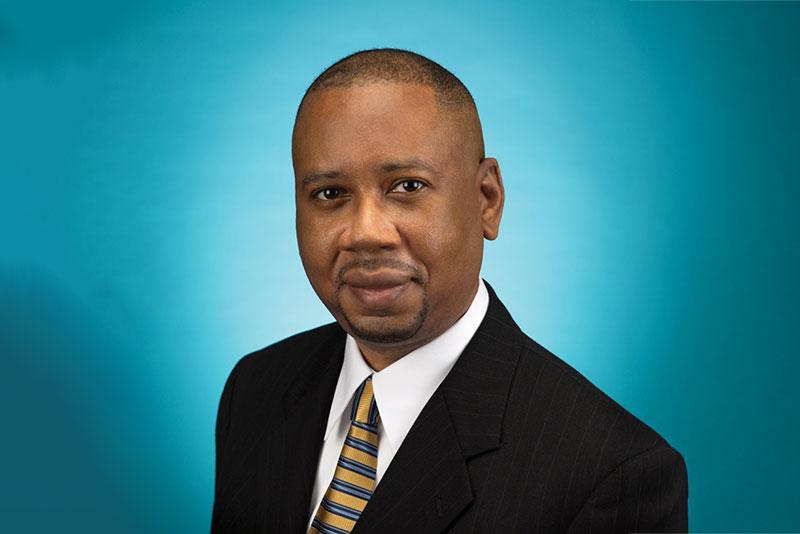Mastering the art of personal branding

When Bouvier Williams, EdD (MBA ’93) graduated from college, his first job was as an institutional annuity representative with TIAA, where he provided administrative support to the company’s pension plan clients. It was in talking with those customers, most of whom were HR professionals, that he first realized the breadth of responsibilities that fall under the function.
“Some were involved with employee training, some were working on compensation, some were doing employee relations, some were doing benefit plan administration, some were even doing people strategy work,” Williams recalls. “I said, ‘Wow, within this one profession, there are dozens of different roles.’ I don’t know if it was the ADHD in me, but I said to myself, ‘If I were an HR professional, I don’t think I’d ever be bored.’”
Williams acted on that early impulse, and today, more than 30 years later, he’s still fascinated by the profession.
As AVP and head of Organizational Development and Change with Beth Israel Lahey Health in Boston, Williams drives organizational development initiatives across the 36,000-employee healthcare system, including talent management, change management, OD, leadership competencies and employee surveys.
Williams began his career in HR after graduating from the Freeman School with his MBA in 1993. Recruited for Citibank’s Management Associate Program, he spent four years with the company as an HR relationship manager. He went on to serve in positions of increasing responsibility with Ernst & Young, JPMorgan Chase, Amazon and Viacom Media Networks, where he developed and implemented talent management, leadership development and performance management solutions for the 16,000 employees of MTV, Vh1, CMT, Nickelodeon, Spike, Comedy Central, TV Land, BET and Paramount Pictures.
“Organizations are dynamic,” Williams says. “The interaction of human beings in a very structured setting like the workplace is where that energy — the human capital — is harnessed, and when properly leveraged, it can achieve powerful results.”
If Williams discusses his profession with the precision of an academic, it’s not a coincidence. In 2014 he earned a doctorate from the University of Pennsylvania. His dissertation was on the benefits of a personal brand, which he defines as, essentially, one’s reputation. While employees might not think about their reputations in the same way they think about brands, Williams notes that when team members are evaluated for promotion, the discussions often focus on their reputations as much as their abilities.
“Yes, it’s about accomplishments, but it’s accomplishments plus relationships and visibility,” Williams says. “If you’ve been doing great work but nobody at the table is really aware or tapped into that great work, you’re going to be seen as needing more experience and/or exposure.
“It’s not about being more technically competent than you already are,” he adds. “It’s often about relationships you need to form. It’s about your prominence in the eyes of others. You want to have a strong, positive narrative.”
For his dissertation, Bouvier interviewed chief human resource and talent officers to understand the impact of one’s reputation for both the individual as well as the organization as a whole.
“Organizations can tap into employee brands,” he explains. “It can be used as an opportunity for development. It can be used as an opportunity for advancement and holding onto talent.”
While the organizational advantage of personal branding is one of the messages Williams communicates to leadership throughout Beth Israel Lahey Health, it’s the individual power of branding he communicates to students as one of the Freeman School’s Industry Experts-in-Residence.
An initiative of the Career Management Center, the program was established in 2023 to connect students with a community of industry leaders that bring real-world guidance and career insights via a one-on-one mentorship and coaching. Students can learn about the expert’s company or job, get personalized advice on breaking into the industry, or practice their interviewing and networking skills.
Williams became an Industry Expert-in-Residence in January 2024, and he’s thoroughly enjoyed the opportunity to meet with students and give something back to Freeman.
“It allows me to help the students going through Tulane and the business school right now the way I was helped when I was a student here,” Williams says. “At the end of the day, my job is to help them fill in certain gaps and figure out how to do things that are in keeping with their authentic selves.”
For example, Williams advises students to avoid submitting multiple job applications cold and instead focus on leveraging their own unique resources.
“It could be alumni, or it could be family members,” he says. “If you are reaching out to people beyond those circles, a good way to frame it is you’re looking for time and expertise — ‘I saw your profile on LinkedIn, I’m impressed with your career journey, and I have a very few specific questions on some of the moves you made in your career. Would you have 15 minutes to connect with me?’ If you ask for a modest amount of time and frame it the right way, you’ve got a much better chance of success.”
And as an Industry Expert-in-Residence, Williams wants nothing more than for students to be successful.
“I’m having an absolute blast in this industry expert role,” he concludes. “I enjoy working with the students, and as long as they’re seeing value in the dialog, I’m happy to do it.”
Interested in advancing your education and/or career? Learn more about Freeman’s MBA programs. Find the right program for you.
Other Related Articles
- Alumna leverages Freeman network to land dream job at Entergy
- Alumna recalls trailblazing career in business, ministry
- Students network their way through Manhattan in annual Real Estate Trek
- Snapping Back: Alumna is HP’s guardian against disruption
- Research Notes: Matthew Higgins
- Lantz named executive director of Career Management Center
- Goes highlights growth, AI initiatives in ‘State of the School’ address
- Research Notes: Claire Senot and Yatish Hegde
